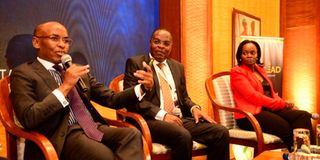Upskilling and continuous learning are key to sustainable leadership

Left to Right: Peter Ndegwa, Group CEO Safaricom, Dr David Oginde - Catalead CEO, and Carolyne Kariuki, Kepsa CEO during the launch of The Catalead Associates, a leadership development platform.
A few weeks ago, I was a keynote speaker at the launch of a leadership development programme committed to inspiring and catalysing Africa’s leaders.
The programme seeks to increase the number of high-impact managers in the continent.
At the event, Dr David Oginde, the lead for the programme, stated that Africa’s ability to harness its potential “lies in the hands of high-impact leaders”.
He developed the programme after realising that even though leaders have the desire to provide good leadership, they do not always have the right tools and capabilities to do so.
His sentiments inspired me to reflect on the attributes of good leadership and why upskilling and continuous learning are key for a holistic approach to leadership.
Continuous learning is vital for leaders and organisations to stay ahead. This, more than ever, places more demand on leaders to take on a new role, which they might initially find unfamiliar, that of facilitating continuous learning within their organisations.
Indeed, as I have learnt, it’s one thing to want to hold a leadership role, and another to want to do the demanding work that ‘learning to lead’ entails.
Certainly, leading is not for the faint-hearted, but the good news is, leaders can be made through retooling, that is, a continuous culture of investing in your leadership capacity; self-improvement and upskilling.
When I started my career at an audit firm, my goal was self-improvement. This helped me transition from accounting to consulting and corporate finance. I would then move to Diageo, specifically to East African Breweries, to head strategy. The following year, I was asked to lead the sales team as the sales director. I would later make another move to become the CFO and from there I later transitioned into the MD/CEO role.
The transition to different roles enabled me to upskill and fill the gaps in my various leadership roles. My experience and encounters have also taught me that good leadership requires a strong and intentional yearning for self-improvement.
It is also important to keep evolving because you don’t have to know everything; you just need to be ready to learn and be guided on new approaches.
Motivate and inspire
I am intentional about building the leadership skills, attributes and capacity. Experience has taught me that occupying a leadership position is not the same as leading. To lead, you must be able to connect, motivate and inspire a sense of ownership of shared objectives.
Therefore, sustainable leadership requires a continuous pursuit of personal development. Perhaps the late John F. Kennedy put it best when he said, “Leadership and learning are indispensable to each other.”
Leaders who are receptive to learning make themselves smaller than the moment. They know they can’t fix everything alone, so, they create the space for others to join them and find solutions together.
Those in leadership positions should view continuous learning as a magnetic north. In my journey, one key lesson has been that, interest and commitment to continuous learning and development, helps one adopt a mindset and behaviour that produces better leadership outcomes.
And those outcomes can never be better demonstrated than when leading through disruptive times. One of the things I have come to appreciate is the need to be authentic and conscious to the fact that you are vulnerable rather than hiding your fears in the face of a crisis.
At any one given time, every leader is dealing with a crisis. And when several crises converge at once, the challenge is even greater. It could be internal or external, and involving various stakeholders such as employees, customers, partners or even an ever-changing business environment.
In such times, the feeling of vulnerability triggers a leader into taking the best course of action for the organisation and, at the same time, have the wisdom to understand when to refine their course of action.
This involves being able to make decisions faster and leading change efficiently, while skilfully influencing in a more interconnected, collaborative approach with all stakeholders
Admittedly, the leadership journey is a gradual race, one that goes through valleys, smaller peaks before you get to the ultimate peak.
The journey of self-improvement in leadership is fascinating and fulfilling if you embrace it. Especially as you navigate disruptive times but staying the course for a sustainable and progressive future.
The writer is the Chief Executive Officer, Safaricom





